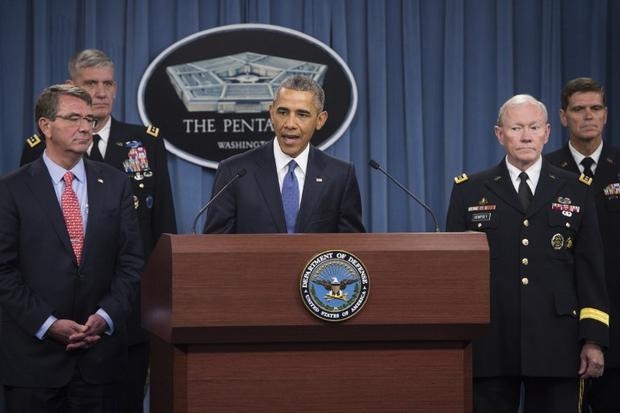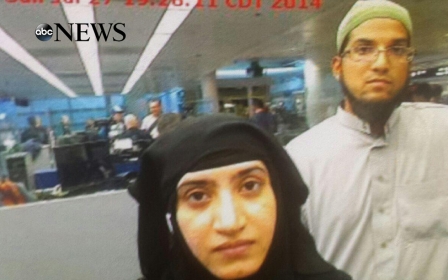US ramps up war on IS propaganda, recruitment

By Paul Handley and Sebastien Blanc
The White House intensified efforts on Friday to fight propaganda and recruitment by militant groups such as the Islamic State, announcing a new task force and pressing Silicon Valley to help out.
The renewed push comes in response to frustration that IS has managed to lure and recruit followers in Europe and the United States to launch deadly attacks without detection by intelligence services.
It also comes amid greater awareness that the recruitment and operational planning by violent extremists is making use of the Internet and other electronic communications in ways that can avoid detection by intelligence.
Added to that is a frustration that US efforts to counter the Islamic State group and al-Qaeda propaganda over the Internet have shown poor results.
"The horrific attacks in Paris and San Bernardino this winter underscored the need for the United States and our partners in the international community and the private sector to deny violent extremists like ISIL fertile recruitment ground," said National Security Council spokesman Ned Price, using another acronym for IS.
The immediate move was the formation of a new unit, the Countering Violent Extremism Task Force, by the Department of Homeland Security and the Justice Department, to coordinate their efforts to fight extremism domestically.
At the same time, the State Department will cut back its direct efforts at countering propaganda by violent groups, in what appeared to be an admission that they haven't worked.
Instead, the emphasis will be on supporting international partners of the US - both governmental and non-governmental - in their programmes to neutralise such groups' promotional activities.
Tech giants pressed to help
As that was being announced, White House top security officials were to meet leading Internet companies in Silicon Valley in an effort to build cooperation with them.
High on the agenda will be how to make it harder for terror groups to use the Internet to recruit supporters and prevent them using technologies like encryption to mask their activities, according to the agenda of the San Jose meeting obtained by AFP.
Underscoring the high importance of the meeting, President Barack Obama's Chief of Staff Denis McDonough will lead the delegation from Washington.
The group will also include Attorney General Loretta Lynch, Director of National Intelligence James Clapper, the directors of the National Security Agency and the Federal Bureau of Investigation, according to the agenda.
From the tech industry, top executives from Apple, Facebook, LinkedIn, Dropbox, Microsoft, Twitter, and YouTube were expected to attend.
The talks come amid mounting frustration in Washington that IS, Al-Qaeda and other groups have been able to use publicly available technology to build their influence and hide their activities from even the most advanced US intelligence operations.
Without any hint it was coming, on 2 December a married couple sympathetic to the IS slaughtered 14 people and injured 22 others in an attack with automatic weapons on a holiday office party in San Bernardino, California.
Days afterward, Obama called on "high-tech and law-enforcement leaders to make it harder for terrorists to use technology to escape from justice."
"The goal here is to find additional ways to work together to make it even harder for terrorists or criminals to find refuge in cyberspace," said White House spokesman Josh Earnest on Friday.
Key issues on the agenda of the Silicon Valley meeting include how to make it tougher for terrorists to leverage the Internet to recruit, radicalise, and mobilise followers, and making it harder for terrorists to use the Internet to facilitate and operationalize attacks.
The meeting though raises a challenge to some of the world's top tech companies, wary of being seen to cooperate with and share data with the US or other governments.
Earnest said that there are precedents for Silicon Valley's social media giants working with security officials, such as in fighting child pornography.
"Technology leaders are patriotic Americans. They don't have any desire for child pornographers or would-be terrorists to be using their tools and their technology to harm innocent people," he said.
"I do think there is an opportunity for there to be a robust discussion about ways we can make it harder for terrorists to leverage the Internet to recruit, radicalize and mobilize supporters," he told reporters.
New MEE newsletter: Jerusalem Dispatch
Sign up to get the latest insights and analysis on Israel-Palestine, alongside Turkey Unpacked and other MEE newsletters
Middle East Eye delivers independent and unrivalled coverage and analysis of the Middle East, North Africa and beyond. To learn more about republishing this content and the associated fees, please fill out this form. More about MEE can be found here.




